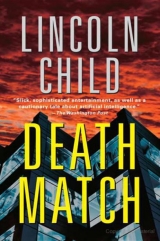
Текст книги "Death Match"
Автор книги: Lincoln Child
Соавторы: Lincoln Child
Жанр:
Триллеры
сообщить о нарушении
Текущая страница: 16 (всего у книги 26 страниц)
THIRTY-FOUR
Sunday dawned raw and cold, and as the sun rose in the sky it seemed to chill rather than warm the land. By afternoon, the whitecaps of Long Island Sound had a leaden cast to them, and the unsettled waters looked black: harbingers of approaching winter.
Lash sat before the computer in his home office, nursing a cup of herbal tea. Miraculously – given the charged atmosphere of his dinner and the late hour at which he parted from Diana – he’d managed a good six hours of sleep and had risen without overwhelmingly weariness. What he did feel was restlessness: barred from removing any data from Eden, and without access to files or records, he had no way to advance his investigation. Yet instinct told him he was close, perhaps very close, to a revelation. And so he’d paced the house, ruminating, until at last in frustration he turned to the Internet and anything he could find about the company.
There was the usual Web ephemera: a scammer that claimed to have unlocked the secrets of Eden and offered to share them on a $19.95 video; conspiracy-theory sites that spoke darkly of evil alliances the company had made with intelligence agencies. But among all the dross there were also occasional bits of gold. Lash sent half a dozen articles at random to his printer, then carried the printouts to the living room sofa.
Feet propped on the table, the mournful cry of gulls sounding in the distance, he leafed slowly through them. There was an exceedingly complex white paper on artificial personality and swarm intelligence, written by Silver almost a decade earlier and no doubt released on the Internet without permission. A financial website provided a sober-sided analysis of the Eden business model, or at least the portion of it that was public knowledge, and a brief history of how it had been bankrolled by pharmaceutical giant PharmGen before being spun off on its own. And from another site came a flattering corporate biography of Richard Silver, who had risen from obscurity to become a world-class entrepreneur. Lash read this more carefully than the first two, marveling at the way Silver had developed his dream so faithfully and resolutely; how he hadn’t let the vaguely reported misfortunes of early youth stand in his way. He was that rarest of people, the genius who seemed to know, from a very young age, the gift he’d been born to give the world.
There were other articles, too, not quite so flattering: an obnoxious tabloid article that promised to expose the “shocking, bizarre” details of the “crackpot genius” Silver. The opening paragraph read: Question: What do you do if you can’t find a girlfriend? Answer: You program one. But the article itself had nothing to say, and Lash put it aside, stood up, and walked to the window.
It was true there were few other tasks Silver could have set Liza to that would have earned him more money, or so ensured the future health of his research. Yet on one level it was a little odd. Here was a man – by all accounts a shy, retiring man – who had made his fortune with that most social of games, the game of love. It seemed a shame, a bitter irony, that game could not extend to Silver as well.
As he stared out the window, the haiku Diana Mirren quoted the night before came back to him with sudden clarity.
Insects on a bough
floating downriver,
still singing.
He smiled as he recalled their dinner. By the time they’d finally gotten around to ordering, the conversation had grown as easy and comfortable as any he could remember. His habitual distance crumbled without even a protest. She began to finish his sentences, and he hers, as if they’d known each other since childhood. And yet it was a strange kind of familiarity, filled with countless little surprises. It was close to one when they parted on Central Park West. They had exchanged numbers before going their separate ways. There had been no agreement to meet again; but then, there’d been no need of one. Lash knew he’d be seeing her again, and soon. In fact, he was half tempted to call now and offer to cook dinner.
What had she said? Haiku were the opposite of puzzles. Don’t search for answers. Think of opening doors.
Opening doors. So how to interpret the one she quoted?
It had only eight words. In his mind, Lash saw a green willow branch, twisting in a lazy current, heading toward a distant waterfall. Stillsinging. Were the insects still singing out of ignorance of what lay ahead – or becauseof it?
The Wilners and the Thorpes were like the insects of the poem, singing on that floating branch. Blissfully, unrelievedly happy… right up until that last unfathomable moment.
The silence was shattered by the ring of a telephone.
Lash pushed himself to his feet and headed for the kitchen. Perhaps it was Diana; he’d have to dig up his recipe for salmon en croute.
He lifted the phone. “Lash here.”
“Chris?” came the voice. “It’s John.”
“John?”
“John Coven.”
Lash recognized the voice of the FBI agent who’d run the surveillance on Handerling. His heart sank. No doubt Coven was following up on his personal interest in Eden. Maybe he thought Lash could get him a discount or something.
“How are you, John?” he said.
“I’m okay, I’m fine. But listen, you’re not going to believe this.”
“Go ahead.”
“Wyre’s made parole.”
Lash felt himself go numb. “Say again?”
“Edmund Wyre’s made parole. Happened late Friday afternoon.”
Lash swallowed. “I didn’t hear anything about it.”
“Nobody has. I just found out ten minutes ago. Saw it on the wire.”
“Not possible. The guy killed six people.”
“Tell me about it.”
“There must be some kind of mistake.”
“No mistake. He got the full board vote and the written report from DCJ.”
“Any release conditions?”
“The usual, under the circumstances. Special field supervision. Which means precisely diddley-squat with a guy like Wyre.”
Lash felt a sharp pain in his right hand, realized he was squeezing the phone. “What’s the time frame? Weeks? Months?”
“Not even. Apparently they’re all in a lather, setting Wyre up as some poster boy for rehabilitation. Screening’s completed. They’re already performing a residence investigation and preparing the release certificate. He’ll be on the streets in a day or two.”
“Jesus.” Lash fell silent, struggling with disbelief.
“Christopher?”
Lash did not reply.
“Chris? You still with me?”
“Yes,” Lash said distantly.
“Listen. Still got your service piece?”
“No.”
“That’s a shame. Because no matter what that parole board thinks, you and I both know this fucker wants to finish what he started. If I was you, I’d arm myself. And keep in mind what they taught us back at the Academy. You don’t shoot to kill. You shoot to live.”
Again, Lash did not respond.
“You need anything, let me know. Meanwhile, watch your six.”
And the line went dead.
THIRTY-FIVE
He was driving home. That’s how it began: driving home from Poughkeepsie yet again, in brilliant sunlight on a Friday afternoon. The last several times he’d made the sixty-mile journey back to Westport, he’d been so tired he feared falling asleep at the wheel. This afternoon, however, he was wide awake.
I’ve got what I need now, the murderer had written in blood on the picture window. Thank you.
He reached down for the car phone, dialed.
“Lash residence,” came the voice of Karl Broden, his wife’s brother.
“Karl.”
“Hi, Chris. Where are you?”
“Heading home. I’ll be there in an hour or so. Shirley home?”
“She went out to run some errands.”
“Okay. I’ll see you soon.”
“Good enough. Say, you want me to fire up the grill, marinate those gulf prawns we picked up last night?”
“There’s an idea. Stick some beers in the freezer for me, too.”
“Done.”
He thought briefly about his brother-in-law. Karl was so unlike his sister. Easygoing and loosely strung, unabashedly nonintellectual. Every time Karl came to visit, the level of tension in the house decreased markedly. This time he’d dropped in suddenly, the day before, almost as if he’d known his presence was desperately needed.
But then his thoughts returned to Poughkeepsie and the stark image of the final murder scene.
I’ve got what I need now. Thank you.
The Poughkeepsie cops had been almost jovial all morning; ribbing each other good-naturedly, exchanging coarse jokes over the water cooler. Even though the killer eluded their roadblocks, they were buoyed by what seemed the promise of no more murders. Lash felt no such relief. To him, the message was the first piece of the puzzle to make sense; the only communication from the murderer that felt real. And its brevity, its confidence, filled him with anxiety.
What did he have now? What had he needed?
Had killing those four women satisfied some sick requirement, filled some void? But that wasn’t how it worked with serial killers: theirs was a consuming thirst that could never be quenched.
And then there was the inconsistency of the killings. The first two, despite superficial similarities – the bloody messages covering the walls, the arrangement of the corpses – contradicted all basic profiles in a dozen ways.
What made this final killing different?
He thought about this all the way across Dutchess and Putnam counties and into Connecticut. It was the first time, he was convinced, the murderer had shown his true colors.
Because he had what he wanted.
Why was there only one message this time, instead of a hundred? And why was it written on the picture window, not the walls? On the glass, against the backdrop of night, it would be extremely hard to make out…
And then suddenly, almost without conscious thought, he found his perspective on the crime scene changing. No longer was he looking at the bloody message from inside the bedroom. His angle shifted, turning as if on a camera dolly, coming around a hundred and eighty degrees until he was outside the house, in the woods, looking from the blackness at the big lighted window. At the figures silhouetted there – a police captain, the lead homicide detective, an FBI profiler. The same three people who’d been at the previous murders.
There was something that the three murders did have in common. They had all taken place at night, in bedrooms with big picture windows. And the blinds of the windows had always been open…
Frantically, he reached for the phone, dialed again.
“Poughkeepsie police, Homicide Division,” came the voice. “Kravitz speaking.”
“This is Christopher Lash. I need to speak with Masterton, right away.”
“I’m sorry, Agent Lash. The captain left half an hour ago.”
“Then give me the lead detective, what’s his name. Ahearn.”
“He left with the captain, sir.”
“You know where they went?”
“It’s Friday night, sir. The captain and Detective Ahearn always go out for a few cold ones before heading home.”
“Which bar?”
“I don’t know, sir. Could be one of half a dozen.”
He thought quickly. Kravitz, the cop at the duty desk, had seemed like a smart, competent officer.
“Kravitz, you need to listen to me. Listen very carefully.”
“Yes, Agent Lash.”
He tucked the phone under his chin briefly while negotiating the exit onto Saugatuck Avenue, fighting the weekend traffic. “You have to try each of the bars, in turn. Hear me? Get some of the other officers to help you man the phones.”
“Sir?” Kravitz’s voice sounded dubious.
“It’s vital, Kravitz, you hear me? Vital.”
“Yes, sir.”
“When you reach Masterton, you are to tell him this: we’ve been wrong about this killer. He’s not a serial murderer.”
“Not a serial murderer?” The voice sounded even more dubious.
“You don’t understand. Of course he’s a murderer. But he’s not a serial-type. He’s an assassin-type.”
That was the tag forensic psychologists used. Sometimes assassin-types murdered random victims from the tops of water towers. Other times they sought out favorite celebrities, the way Mark David Chapman did. They had one thing in common: tortured, useless lives that only developed meaning through acts of targeted violence.
Meanwhile, there was silence on the other end of the line.
“I don’t have time to explain, Sergeant. It’s a subcategory of mass murderer. For them, it’s all about domination, control, revenge. This guy hates cops. There’s probably a fascination, a love-hate dynamic, working here. Maybe his father was both a cop and an abusive parent, I don’t know. But he’s an assassin-type. It’s the only answer.”
“Sir, I don’t understand.”
“You were at the scenes of the first three murders. There was no pattern. The meaningless messages on the walls, the inconsistent tableaux. Nothing fit. That’s because we were dealing with somebody imitating a serial murderer. That’s why nothing held together: it was all a ruse. Did you notice the big picture windows at each site, open to the night? Our killer wasn’t running away: he was out there, every time. He was hunting cops, picking out his targets. Those murdered women were just bait.”
“Sir?”
He pulled the car onto Greens Farms Road. In another minute or two, once he got home, he’d start making calls himself. For now, he had to rely on Kravitz. Seconds counted.
“Just do as I say, Officer. Find Masterton, tell him everything I just told you. He and Ahearn were at the window each time, they have to take steps to protect themselves. Tell him to look for a white male, most likely in his mid to late twenties. A loner, but somebody who can blend with the crowd. He’ll probably be driving a sporty car to compensate for low self-esteem. You need to talk to your fellow officers about any wannabees they might have noticed recently, hanging around cop bars and restaurants, ingratiating themselves.”
Another silence on the line.
“Kravitz, damn it, do you have that?”
“Yes, sir.”
“Then get busy.” Just ahead lay his own block, and home. Traffic was lighter here. As he hung up, a car pulled out of his street and accelerated past him down Compo. A Pontiac Firebird, red.
He drove past, barely noticing. He reminded himself that he, too, was a target. He’d been silhouetted in that window, too. He’d have to get Karl and Shirley out of the house – she’d wither him, as usual, with comments on how dangerous his job was – and then he’d have to look into what to do about his own—
He started abruptly. A Pontiac Firebird, red, recent model…
He slowed, glanced into the rearview mirror.
The car was gone.
Now he stepped on the accelerator again, hard, taking the corner with a shriek of rubber, pulling his gun from its holster, but even as their house came into view he felt a cold dread seize him.
He already knew, with terrible certainty, what it was he would find inside.
THIRTY-SIX
Lash leaned back and stared at the ceiling. Even there, columns of numbers, names, dates seemed to stare back at him.
“Christ,” he groaned, shutting his eyes. “I’ve been staring at this stuff too long.”
He heard the shuffling of paper across the table. “Any luck?” he asked the ceiling.
“Not a bite,” came Tara Stapleton’s voice.
Lash opened his eyes, stretched. Despite the dark dreams and memories that had filled the previous night, he’d nevertheless awakened with a sense of purpose. The weekend had passed without any dread events. Driving in, he’d called Diana Mirren on his cell phone. The mere sound of her voice brought him a secret, almost adolescent thrill. They chatted briefly, ardently, and she’d agreed to have dinner at his place the coming Friday. He found himself so busy mentally preparing that he forgot the mortification he’d endured at Checkpoint III until he found himself standing before it once again. But the security officers were not the ones on duty last Friday, and he’d passed through without a hitch.
But now – midmorning – his excitement had drowned in an endless flood of data. There was simply too much material to comb through; it was like sifting a haystack without even being certain it contained a needle.
He sighed again, then pulled Lindsay Thorpe’s internal evaluations over and began leafing through them almost idly. “What’s the story on the third couple? The Connellys?”
“They’re leaving for Niagara Falls tomorrow.”
“Niagara Falls?”
“That’s where they spent their honeymoon.”
Niagara Falls, Lash thought. Great place for a murder. Or a suicide, for that matter.
“There’s not much we can do on the Canadian side,” Tara added. “I spent most of Saturday arranging the passive surveillance over there. We watch, and hope for the best.”
“At least you had something to keep you busy over the weekend.”
Tara smiled slyly. “It wasn’t as if you didn’t have your dance card filled.”
“You mean, my date?”
“How did it go?”
“She didn’t look at all the way I expected. Didn’t soundthe way I expected. But you know what? Within ten minutes, it didn’t matter.”
“Our research has shown that we’re often attracted to the wrong people, for the wrong reasons. Maybe that’s why so many marriages don’t work.”
She fell silent.
“Look,” Lash said after a moment. “Why don’t you go through with meeting this guy they’ve matched you with? It isn’t too late. Talk to Mauchly about rescheduling the reservation.”
“I’ve already told you. How can I meet him, knowing what I know?”
“I met Diana Mirren, knowing what I know. And I’m seeing her again this Friday.”
“But I’m an Eden employee. I’ve told you—”
“I know. The ‘Oz effect.’ And you know what I say? Bullshit.”
“Is that your professional opinion, Doctor?”
“It is.” He leaned forward. “Tara, listen. Eden can match one person with another. Perfectly. But once you two make contact, there isno more Eden. It’s just you and him. If it feels right, you’ll know it.”
Tara looked at him, saying nothing.
“One way or another, we’ll solve this. And then it won’t matter anymore. It’ll just be a memory. The past. And any relationship requires an acceptance of the past. Would you begrudge him the cheerleaders he dated in college? This is the main chance, Tara. Take it from somebody who was in that restaurant two nights ago.”
Immediately, Lash realized he’d said enough. Back to work, he thought with a sigh.
Putting Lindsay Thorpe’s dossier aside, he began paging through her medical reports. Then he paused.
“Tara.”
She looked at him a little guardedly.
“About this return checkup of Ms. Thorpe’s.”
“You mean, class reunion?”
“No, this checkup. Is it common for your doctors to prescribe—”
“We don’t do that.”
For a moment, this did not register. Then Lash looked at her. “What did you say?”
“I said, we don’t do return checkups.”
“Then what’s this?” Lash pushed the medical report across the table.
Tara took the report. There was silence as she scanned the pages.
“I’ve only seen this a few times before,” she said.
“Seen what?”
“Remember, on your first tour inside the Wall, Mauchly explained about the long-term health analyses we run on prospective candidates? Checking genetic markers for inherited diseases, risk factors, that kind of thing?”
“Yes.”
“If there’s something seriously wrong, we reject their application. But if it’s minor, or of minimal long-term concern, we’ll process their application and bring them back for a secondary exam, later.”
“Under the pretext of standard operating procedure.”
“That’s right.”
“No point in turning away a paying client.” Lash took back the report, flipped the pages. “But Lindsay Thorpe had no such health issues. Yet she was scheduled for a follow-up examination, six months prior to her death.” He flipped more pages. “At this exam, Ms. Thorpe was given a prescription for scolipane. One milligram, once a day. I’m not familiar with that medication.”
“Me neither.”
“The physician in attendance was a Dr. Moffett. Could you contact him, ask the reason for the follow-up exam and prescription?”
“Sure.” Tara rose and walked to the phone.
Lash watched her. This was another clue, he felt certain; another piece of the puzzle.
“Dr. Moffett’s hours don’t begin until noon,” Tara said as she replaced the phone. “I’ll contact him then.”
“Would you do something else? Pull the medical records of Lewis Thorpe, the Wilners, and – and the third couple, the Connellys. See if they had any follow-up examinations.”
Lash waited as the office filled with the sound of keystrokes.
“Nothing,” Tara said. “None of the others had any follow-ups beyond the normal class reunions.”
“Nothing?”
Tara shook her head.
“Wouldn’t Lewis Thorpe think it strange his wife had a follow-up exam when he didn’t?”
“You know how secretive we are about procedures. Our clients come to accept them without question.”
Lash slumped in his chair. Despite everything, he found his thoughts returning to Diana Mirren, what she’d said about haiku.
They hint at things. They imply more than they say. Don’t search for an answer. Think instead of opening doors.
So what was implied here? What coincidences had taken place recently? And what did they hint at?
Edmund Wyre, the cop-hating assassin, granted parole. Wyre killed three women, two cops, and Lash’s brother-in-law. Lash’s wife then left him, and Lash himself – full of doubt and self-blame – had abruptly left the FBI, searching for an end to the sleepless nights.
By rights, Wyre should never have been paroled. Lash had no illusions: no matter what the parole board thought, Wyre would be gunning for him. Lash was the one he’d missed.
Was this coincidence?
Then there was his avatar being sent into the Tank. Tara had said such a mistake was impossible. If so, somebody had done it deliberately: It would have to be somebody very highly placed, somebody with world-class access. Me, for example. Or a grunt who’d somehow hacked the system.
His gaze fixed on Tara, who had returned to the table and was sorting papers.
Think of opening doors…
And, suddenly, the door opened.
Lash gasped, almost as if he’d been dealt a blow. He covered the sound with a yawn.
It seemed impossible. But there was no other answer.
There were two things he still needed to know before he was sure. Tara could answer one of them. But he had to appear calm – at least, until he had proof.
“Tara,” he said with exaggerated weariness. “Could you do something else for me?”
She nodded.
“Could you bring up a list of all the avatars in the Tank when the Thorpes were matched?”
“Why?”
“Just humor me.”
She walked once again toward the computer. Lash followed.
“Show me how it’s done,” he said.
“First, you have to access the avatar database.” She entered a transaction code at the menu screen and an explosion of nine-digit numbers appeared. “These are all the avatars.”
“ All?”
“All clients to date. Almost two million.” She typed some additional commands. “Okay. I’ve created an SQL query you can run against this dataset. Type in the avatar’s identity code, and it will bring up all the others that were in the tank at the time of its match.”
“Show me, please.”
She lifted the piece of paper. “Here’s that sheet we printed out Friday, showing the dates the Thorpes and Wilners first submitted their applications.”

“Lewis Thorpe’s identity code is 000451823. You enter that into the query field.”
She typed it in and the screen refreshed again.
“Here are all the avatars in the Tank when Lewis was matched to Lindsay, indexed by their identity codes.” She scrolled quickly down to the bottom of the list:
000481032
000481883
000481907
000482035
000482110
000482722
000483814
000483992
000484398
000485006
QUERY COMPLETED AT 11:05:42:82 10/04/04
DISCRETE UNIT COUNT: 52,812
>?
Tara pointed at the bottom line. “In that time-slice, there were almost twenty-three thousand Avatars in the tank.”
“But it’s just a bunch of numbers.”
“This function key lets you toggle between names and identity codes.” Tara pressed a key and the numbers were replaced by names:
Fallon, Eugene
White, Jerome
Wanderely, Helen
Garcia, Constanze
Lu, Wen
Gelbman, Mark
Yoshida, Aiko
Horst, Marcus
Green-Carson, Margo
Banieri, Antonio
Shit, Lash thought. It’s still sorted by identity code, not last name. He considered asking Tara for an alphabetical sort, but decided against it: he wasn’t ready to explain. He began paging back through the names, one screen after another.
“What are you looking for?” Tara asked, gazing curiously over his shoulder.
“Just looking. Listen, would you do one more thing?”
“Just one more thing. Just one more thing. I wish I got paid by the errand.”
“I think we made a mistake, looking just at the records of supercouples.”
“Why?”
“Look at what we found out about Lindsay Thorpe and her surprise medical exam. Who knows what else we might find if we cross-check against a random sample of regularcouples?”
“Makes sense.” Tara hesitated. “I’ll go requisition the records.”
“Hurry back.”
He watched her go. Although he was genuinely curious about the comparison he’d suggested, right now he was most interested in examining the screen without another pair of eyes beside him. He began once again scrolling up the names.
It took longer than he thought to go through them all, and it was almost eleven-thirty by the time he reached the top of the list. He slumped back, disappointed. But then again it would have been too easy: finding the name he was hoping for, just like that. Maybe it was a crazy idea. He cringed at the idea of plodding through another huge set of names. Still, he’d come this far: he might as well try the Wilners. Just in case.
He hit the function key Tara had pointed out. Instantly, the screen refreshed, showing the avatars in numerical order.
START OF QUERY
==========
000000000
000448401
000448916
000448954
000449010
000449029
000449174
000449204
000449248
000449286
He straightened. What was that first code, 000000000, doing there?
He toggled the function key, but there was no corresponding name for the identity code: the field was blank.
He shrugged, reached for the paper Tara had left on the desk, and typed John Wilner’s code—000491003—in the query field.
When the screen refreshed, 000000000 was again at the top of the list. And once again, there was no name associated with the number.
Lash scratched his head. What was it? A start-of-array marker?
One more test. Rising from the chair and coming quickly around the desk, he rooted through the paper strewn across the table until he found a sheet with Kevin Connelly’s identity code. He returned to the computer, typed it in, stared at the fresh list of numbers.
“Jesus Christ,” he breathed.
The door opened and Tara stepped in, carrying a stack of reports. “I plucked out a dozen names at random,” she said. “I thought the evaluations would be enough to—”
Lash cut her off. “Come over here. Please.”
She dropped the folders on the table and approached the monitor.
Lash looked at her, no longer trying to conceal his rising excitement. “I want you to pull up one more list. Show me who’s in the Tank, now.”
She frowned. “What’s going on? What are you doing?”
“Tara, please. Just do this.”
She stared at him, hard, another moment. Then she bent over the keyboard and typed in a new query.
The screen cleared, and Lash looked at it eagerly. He nodded to himself, as if confirming some private suspicion.
Then, suddenly, he snapped off the power. The screen went dark.
“What the hell?” Tara said.
Without answering, Lash grabbed the phone, snugged it beneath his chin, dialed a long-distance number.
“Captain Tsosie’s desk, please,” he said. There was a brief wait. “Joe? It’s Chris Lash. Joe, is the Thorpe house still technically under police investigation? Thank God. Listen, I want you to send a field agent over there right away. You still have my cell number? Give it to the agent, have them call me the moment they’re on the premises. Yes, it’s that important. Thanks.”
He replaced the phone, looked at Tara. “There’s something I have to do. I can’t explain right now. I’ll be back soon.”
He grabbed his coat, made for the door. Then he turned back. Tara remained at the desk, staring after him, a strange expression on her face.
“Follow up with that doctor,” he said. “Dr. Moffett. Understand?”
Tara nodded. And Lash turned, tugged open the door, and was gone.








